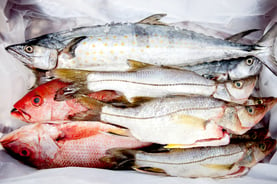
Histamine fish poisoning is a common toxicity related to eating fish.
40% of seafood-related food-borne illnesses reported each year are due to histamine fish poisoning. This is different than an allergic reaction. What causes this?Histamine fish poisoning looks like an allergic reaction, but it is actually caused by bacteria generated toxins in the fish's tissues. If you eat an inadequately preserved ceviche or improperly refrigerated fish you can experience histamine fish poisoning.
This used to be called mahi-mahi flush or scombroid fish poisoning. Scombridae or dark meat fish is Greek for scombros which means mackerel or tunny. Implicated fish are mackerel, tuna, marlin, swordfish, albacore, bonito, skipjack, herring, sardines, anchovy, bluefish and 100 other species. Fish from tropical waters are more likely to be involved in outbreaks, but histamine fish toxicity is worldwide and affects people of all ages, races and genders. If you're traveling to the tropics this summer be aware of your environment.
The typical presentation of histamine fish poisoning is skin flushing on the upper body, G.I. complaints and a throbbing headache.
The key to this problem is previous inadequate refrigeration because cooking, smoking or canning the fish does not eliminate the histamine that is built up. Fish has to be chilled immediately after being caught and you want to keep it at an internal temperature of 50 degrees F within 6 hours of the fish's death. This is why our family buys only fish frozen at sea. It's the only way to meet that standard if you don't fish yourself or buy it off the docks.
High histamine fish don't look different or smell fishy. Bacterial contamination occurs unevenly in fish so you could eat one part with no effects and a different bite might be loaded with histamines. Size and spot of the portion consumed makes all the difference. Some individuals are genetically sensitive to or cannot metabolize histamine because they are lacking or missing an enzyme.
I prescribe an enzymefrom Xymogen to many of my patients who have poor gut function and impaired enzyme pathways. Call us for a prescription.
What are the symptoms and how soon do they appear?
Symptoms present within 15-60 minutes of eating the fish. Manifestations include:
-
Erythema of the face, neck, and upper torso (redness)
-
Headache (severe and throbbing)
-
Dysphagia (difficulty swallowing)
-
Nausea and vomiting
-
Abdominal cramps or epigastric pain
-
Diarrhea
-
Palpitations
-
Pruritus (non-stop itching)
-
Dizziness
-
Dry mouth
-
Angioedema (swelling in your subcutaneous tissues: lips, face; if your throat swells and blocks your breathing this is serious)
-
Sense of anxiety or unease (I'd be anxious)
-
Respiratory distress and chest tightness (rare)
-
Loss of vision (rare) (then you're really lost at sea)
Will you live? Yes, patients with histamine fish toxicity have a good prognosis. Involvement is rapid and complications are rare.


